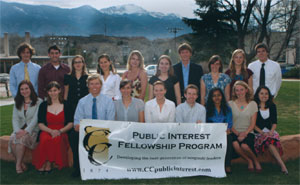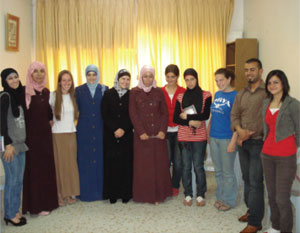You’ve seen the bumper stickers, or the t-shirts: “I am a liberal arts graduate. Would you like fries with that?” A criticism sometimes leveled at liberal arts education is that its broadly educated, creative-thinking students lack specific skills that translate to the career world.
While we believe the value of a liberal arts education is self-evident, two programs at Colorado College are helping to ensure that students move successfully into postgraduate projects and careers — the Public Interest Fellowship Program and the Transitions Fellowship Program.
The Public Interest Fellowship Program

The 2009 Public Interest Fellowship Program fellows.
Nearly 26 percent of Colorado College alumni who graduated in the last five years chose to work in the nonprofit sector. Understanding the strategic importance of the sector, the Public Interest Fellowship Program is helping to foster a new generation of nonprofit leaders.
Current students can apply for 12-week, paid summer fellowships and graduates can apply for yearlong, paid fellowships. The fellowships provide meaningful work experiences in nonprofits that are seeking systemic solutions to societal problems. In this process, PIFP offers nonprofits access to qualified, versatile, and committed young newcomers to the sector. It also draws on experienced local alumni to interview candidates, provide training and mentorship, and host fellows at nonprofit organizations with which they are involved.
The synergistic arrangement of the PIFP is working. The nonprofits love the CC kids. Alumni feel good about giving back and meeting students and recent graduates. Current students get real-world experience, which they bring back to the classroom. And over the course of the program, 15 out of 35 yearlong PIFP fellows have been hired by their host organizations after their fellowships.
Not surprisingly, the program has grown in popularity over the years. In 2004-05, PIFP received 34 applications and placed 10 fellows. In 2010-11, they received 83 applications and will place 22 fellows.
PIFP started in 2003, when Sociology Professor Jeff Livesay became interested in starting a program at CC modeled on one at Princeton. Livesay, the Career Center, alumni office, and a group of interested alumni came together to form CC’s program. One alumna, Ann Oatman-Gardner ’80, was the first coordinator of the PIFP and helped get it off the ground. Another alumna, Lani Hinkle ’83, now administers the program on a part-time basis.
“If this program had been in place when I was in school, I would have wanted to be involved. It’s a compelling program on many levels,” Hinkle said.
Thirty-thousand dollars in seed money from the CC president’s office got the PIFP through its first year. Since then, the program has operated on alumni donations. Now, PIFP has a unique opportunity to create an endowment that would allow the program to continue into the future.
In December 2007, a CC alumna from the class of 1992 pledged $500,000 from a family foundation toward a $1 million endowment. The pledge is in the form of a challenge grant. The challenge runs through December 2010, and any gifts made by that time will be matched dollar for dollar.
Two Fellows’ Experiences
Sophie Glass ’09 wanted to gain exposure to the environmental nonprofit field and gain a deeper understanding of issues such as land conservation and smart growth. Glass is doing her fellowship with the Sonoran Institute. During her fellowship, she has established the Western Counties Action Network (WeCAN) — a coalition of local elected officials in the Intermountain West who are interested in land conservation and smart growth issues. She also has helped organize a transportation reform forum in northern Colorado and assisted in organizing and facilitating the Community Energy Futures Institute to discuss how to transition into the clean energy economy.
“I now have a much better understanding of what it means to be involved with environmental policy. I am closer to identifying my niche in the world of environmental advocacy,” Glass said.
Phoebe Jiang ’09 is pursuing her fellowship at the Denver School of Science and Technology. At DSST, she serves as an advisor to 17 sixth-grade girls; participates in community outreach presentations, both to prospective families and to fifth-grade students; and will likely teach an upcoming elective class. She also established a debate team and serves as the faculty sponsor for the robotics team fundraising committee.
“Since taking on my fellowship, I’ve learned so much about the office work environment, as well as things that I didn’t anticipate, such as classroom management and leadership styles,” Jiang said. “Also, I now know that I want to dedicate my life to expanding educational opportunities for all children.”
The Transitions Fellowship Program
Graduating seniors at CC can gain experience and expand their networks following graduation with The Transitions Fellowship Program (TFP). This experience can lead to career paths in the private sector, public service, or the nonprofit sector.
The TFP was launched in 2008 and since that time has received 85 applications and awarded 35 fellowships to graduating seniors. A committee of CC alumni, administrators, students, and faculty reviews applications and selects fellows from across disciplines, with awards ranging from $500 to $4,000. Beginning as a two-year pilot project, the TFP’s unusual success has prompted the college to look for new ways to sustain this innovative program.
“We know of no other institution with a program of this kind,” said Ella Street ’09, a paraprofessional in the office of the dean who helps run the TFP. “The TFP distinguishes CC as an institution committed to its students beyond their undergraduate years, and determined to support graduates as they explore career opportunities.”
Street, a political science major, was a recipient of a TFP fellowship the summer after she graduated in 2009. She plans to continue her studies and apply to doctoral programs in French political thought.
Following are two more examples of TFP fellows’ projects from 2009:

The Oregon solar array where Mat Elmore ’09 conducted research for his TFP internship.
Mat Elmore ’09, a philosophy major, designed his own internship with the Oregon Environmental Council, where he researched sustainable viticulture. He divided his time between the OEC’s downtown Portland office and fieldwork in local vineyards. Elmore worked on several projects, including conducting preliminary research for The Carbon Neutral Challenge for Oregon Wineries; developing sustainable viticulture guidelines brochures for wineries; and assisting Ecos consulting firm with their carbon accounting efforts in the area.
“Because there was no existing internship program, I largely created my own job description, which is a rarity. Not only was I able to make connections that will last for years to come, I was given priceless experience in the field I would like to pursue for my career,” said Elmore. Following his summer internship, Elmore was hired as an independent consultant for The Carbon Neutral Challenge for Oregon Wineries.

Emily Schneider ’09 (third from left) with other members of the Israeli Committee Against House Demolitions in Jerusalem.
 Emily Schneider ’09, who majored in sociology, interned for the summer with the Israeli Committee Against House Demolitions (ICAHD) in Jerusalem. As an intern, Schneider developed a comprehensive educational booklet on house demolitions in the West Bank. She collected relevant data, researched the legality of these practices in terms of both Israeli and international law, and explored the effects of house demolitions on various population groups. Schneider worked with representatives from the United Nations, Amnesty International, and Human Rights Watch, and travelled to sites throughout the West Bank and East Jerusalem to conduct her research.
Emily Schneider ’09, who majored in sociology, interned for the summer with the Israeli Committee Against House Demolitions (ICAHD) in Jerusalem. As an intern, Schneider developed a comprehensive educational booklet on house demolitions in the West Bank. She collected relevant data, researched the legality of these practices in terms of both Israeli and international law, and explored the effects of house demolitions on various population groups. Schneider worked with representatives from the United Nations, Amnesty International, and Human Rights Watch, and travelled to sites throughout the West Bank and East Jerusalem to conduct her research.
“My internship provided me with a unique opportunity to assume a leadership role in one of the leading human rights NGOs in Israel,” said Schneider.
NOTE: This article is from a previous issue of the Bulletin, therefore the information contained within may no longer be current. See the most recent issue here.